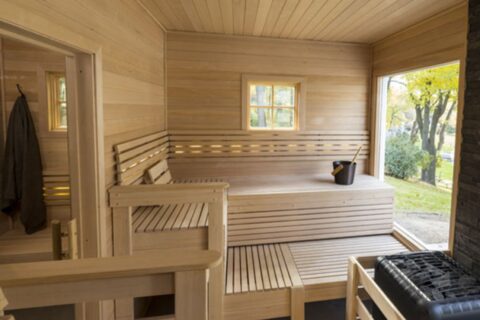Get Better Sleep Through an Evening Sauna Routine
Getting quality sleep regularly is vital for maintaining health and wellbeing, although somewhere between 50 and 70 million people in the U.S. have continuing sleep disorders. Without proper sleep, the brain has difficulty functioning properly. Long-term sleep deficiency can lead to a number of health issues, including cognitive deficiency, mood changes, weakened immune system and increased risk of mental health conditions. One all-natural method to assist with getting a better night’s sleep is through heat therapy; e.g. sauna bathing.
The Science Behind the Sleep Benefits
Raising your body temperature, through sauna bathing and other techniques, can significantly increase sleep quality. Dr. Rhonda Patrick of FoundMyFitness recently posted a scientific discussion that deep-dives into how heat exposure can improve slow-wave sleep (aka, the good stuff); we’ve highlighted some of her conclusions below. Here’s her full deliberation:
#1: Defining Slow-Wave Sleep
During a night’s sleep, our body progresses through four sleep stages, with slow-wave sleep being the third stage. During this slow-wave sleep stage, the body relaxes into a deep rest. Slow-wave sleep is known to be the most restorative sleep stage. Cycling through this deep sleep stage is important because it not only helps us feel refreshed and energized when we wake up, but it appears to assist with immune function, growth and memory.
#2: Heat + Hormonal Effects + Better Sleep
Hormonal effects of heat exposure also promote sleep. Growth hormone and prolactin are the two key hormones that are important in regulation of slow wave activity. According to Dr. Patrick, “Regular sauna use is likely one of the powerful stimuli that increases both growth hormone and prolactin.” Watch her full video above to learn how heat impacts these hormones, which in turn enhance sleep.
What we want to call attention to are the result variations that can be found through sauna:
- Patrick emphasizes that the research findings displayed growth hormone levels increased significantly after longer sauna bathing sessions, proving the possibility for heat therapy to improve deep sleep.
- Prolactin promotes REM sleep which regulates slow-wave sleep. Plasma prolactin levels also increased during sauna sessions, with higher levels observed as heat exposure intensified.
Sauna Protocol for Better Sleep
Based on scientific literature, a credible sauna protocol for sleep improvement is a 20-minute sauna session at 176 degrees Fahrenheit, 1-2 hours before bed. Timing the sauna session a couple hours before bedtime allows the body to cool down before going to sleep.
In conclusion, passive body heating (which can be done through sauna), can be a useful way to improve sleep quality, which enhances overall health and wellbeing.
Other ways to hear this research, and more, from Dr. Rhonda Patrick of FoundMyFitness:
References:
Newsom, Rob. “Slow-Wave Sleep: An Overview.” Sleep Foundation, 15 May 2023, www.sleepfoundation.org/stages-of-sleep/slow-wave-sleep#:~:text=Slow%2Dwave%20sleep%2C%20also%20called,for%20waking%20up%20feeling%20revitalized.
Patrick, Rhonda. “How Heat Therapy Improves Slow Wave Sleep.” YouTube, 30 May 2023, www.youtube.com/watch?v=rHKIs5Kcyo0.
“Sleep Science and Sleep Disorders.” National Heart Lung and Blood Institute, www.nhlbi.nih.gov/science/sleep-science-and-sleep-disorders#:~:text=About%2050%20to%2070%20million%20Americans%20have%20sleep,blood%20pressure%2C%20stroke%2C%20diabetes%2C%20obesity%2C%20and%20certain%20cancers. Accessed 29 June 2023.
“What Are Sleep Deprivation and Deficiency?” National Heart Lung and Blood Institute, 24 Mar. 2022, www.nhlbi.nih.gov/health/sleep-deprivation.


